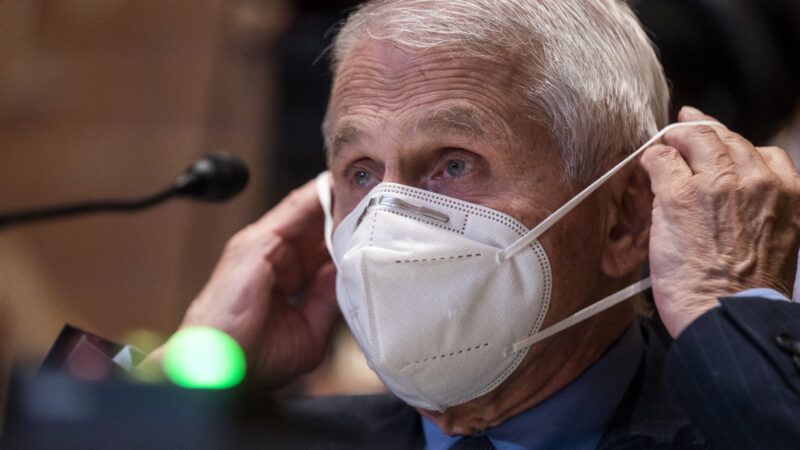Where Is the Republican Plan To Reform Public Health?
The GOP has understandably cast Anthony Fauci as a villain, but there are few plans to overhaul public health bureaucracies.

Few figures have been as relentlessly vilified by the Republican Party as Anthony Fauci. In 2021, a group of House Republicans introduced a piece of legislation, called the Fire Fauci Act, to eliminate the top health official's salary. More recently, when the director of the National Institute of Allergy and Infectious Diseases announced his plan to retire, House Republicans vowed to pursue investigations into Fauci after he left public service, though it's unclear what form this would take.
And then there is Florida Gov. Ron DeSantis, perhaps the GOP's most vocal Fauci opponent, selling t-shirts and drink koozies emblazoned with slogans like "Don't Fauci my Florida," and flip-flops with the words "Fauci can pound sand." DeSantis gave the public health official a characteristically crass send-off, saying, "someone needs to grab that little elf and chuck him across the Potomac."
As the DeSantis koozie slogan suggests, many of these objections are as much to what one might call Fauciism as to Fauci himself. These Republicans, and the voters to whom they are attempting to appeal, object not just to the man but to the bureaucratic public health ethos he represents.
One needn't endorse DeSantis' crude remarks to find fault with the way America's public health establishment has comported itself during the last two years and change, from botched testing to divisive school closures to confusing and contradictory masking recommendations to dithering on vaccine approvals.
At best, the nation's public health apparatus has communicated its guidance poorly and slowly, relying on euphemisms and distortions born out of a sense that the public cannot be trusted with plain, direct language. At worst, it has acted imperiously, pushing highly politicized policies backed by scant evidence while claiming the authority of science, and refusing to acknowledge the considerable human and economic costs of its pandemic-response policies.
Moreover, there is reason to be concerned that the public health community has not learned any lessons from COVID: Many of the same errors are being committed again, in response to monkeypox.
All of which is to say that America's public health agencies represent a legitimate target for both criticism and reform. Although the Republican Party has delivered plenty of the former, it has produced almost no plan for the latter. Republicans have spent the past two years berating the public health establishment for its failings, but they have no apparent plan to reform the agencies. With a handful of exceptions, they are stuck at the level of schoolyard insults and koozie catchphrases.
It's not that public health agency dysfunction has gone undiagnosed. In his book Uncontrolled Spread, former Trump administration Food and Drug Administration (FDA) Director Scott Gottlieb paints a damning portrait of the bureaucratic blunders made by the Centers for Disease Control and Prevention (CDC) not only during the COVID-19 pandemic but also in the years leading up to it.
It's been widely reported, for example, that the agency botched the test kit rollout during COVID, releasing a faulty, contaminated test as COVID first spread.
But what's less widely known is that the agency also struggled with test kits during the Zika outbreak years earlier. As the Government Accountability Office reported all the way back in 2017, the agency's process for authorizing diagnostic tests was plagued by poor communication and manufacturing challenges. Both CDC and FDA did not follow "some of their guidance in communicating with users of diagnostic tests, including providing clear information that would have enabled users to more easily compare performance across different tests," the GAO report concluded.
Gottlieb also recounts how the CDC resisted early calls for widespread testing during COVID, in part because that would have meant relying on private labs, relinquishing its gatekeeper status in the process. Gottlieb also documents how the agency promoted arbitrary physical distancing rules that had little basis in science well into 2021, even though those rules contributed to school closures.
So the agency has both mundane bureaucratic process problems and more deeply rooted internal culture problems that interested critics could tackle through reform.
Most Republicans, however, have offered little beyond sneers and slogans to advance their criticisms. One exception is Sen. Mitt Romney's (R–Utah) plan to create a separate public health data agency aimed at responding more quickly during outbreaks. This might have some benefits at the margins, but it would hardly amount to the extensive cultural reform the public health bureaucracy needs.
If anything, the CDC seems more likely to reform itself than most of its loudest GOP critics seem likely to reform the agency: officials recently announced an internal overhaul focused on faster data analysis and clearer public communications, though the agency has not yet spelled out its reform plan in detail.
Sadly, bureaucratic inertia is a powerful force, and the CDC's centralized processes and gatekeeper mentality won't be fixed by more capable communications. At heart, the agency's problem, as Reason's Ron Bailey recently argued, is that it has strayed from its core mission of fighting infectious disease, becoming a broader "public health" agency concerned with social issues like obesity and gun violence when what's needed is a narrower and more discrete focus on viral pathogens. The Centers for Disease Control and Prevention should focus on, well, diseases.
For now, critics will have to hope that the CDC's internal reforms make some productive headway because there is scant evidence that public health's political critics have any plans to fix the problems they complain about so incessantly.
